Home | Category: Age of Caesar / Age of Augustus / Famous Emperors in the Roman Empire
JULIUS CAESAR
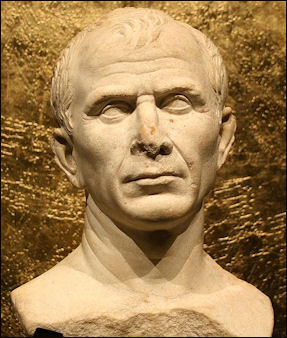 Julius Caesar (?102-44 B.C.) is one man who could rightfully make the claim he changed the course of history. As a general his greatest achievement was the conquest of Gaul, which he described himself with great eloquence in his campaign memoirs. His popularity was such that he was able to bring his armies into Rome, end Roman republican government and declare himself dictator for life, ushering in four centuries of Roman emperors.
Julius Caesar (?102-44 B.C.) is one man who could rightfully make the claim he changed the course of history. As a general his greatest achievement was the conquest of Gaul, which he described himself with great eloquence in his campaign memoirs. His popularity was such that he was able to bring his armies into Rome, end Roman republican government and declare himself dictator for life, ushering in four centuries of Roman emperors.
As a statesman he brought Roman culture to much of Europe and the Middle East and set up an effective administration system that would allow the Romans to rule over one of the largest and most enduring empires the world would ever know.
The period between 80 B.C. and A.D. 40 was one of the most pivotal and memorable in Roman and world history. It was when the Roman republic ended and was replaced by the Roman Empire and it was filled with larger-the-life characters like Caesar, Cleopatra, Spartacus, Marc Antony, Augustus, Jesus and Caligula. Among those who have mined it for material have been Shakespeare, George Bernard Shaw and Robert Graves.Book: “Caesar, Life of a Colossus” by Adrian Goldsworthy (Yale University Press, 2006)
RELATED ARTICLES:
JULIUS CAESAR’S LIFE AND CHARACTER europe.factsanddetails.com ;
JULIUS CAESAR'S RISE AS A POLITICIAN: CICERO, CATO AND THE CATILINE CONSPIRACY europe.factsanddetails.com ;
JULIUS CAESAR'S MILITARY CAREER: SKILLS, LEADERSHIP, VICTORIES europe.factsanddetails.com ;
CAESAR, POMPEY AND CRASSUS europe.factsanddetails.com ;
CAESAR, THE CROSSING OF THE RUBICON AND THE SITUATION IN ROME AT THE TIME europe.factsanddetails.com ;
CIVIL WAR AFTER CAESAR CROSSES THE RUBICON europe.factsanddetails.com ;
CAESAR’S DICTATORSHIP factsanddetails.com ;
ASSASSINATION OF JULIUS CAESAR europe.factsanddetails.com
Websites on Ancient Rome: War Commentaries by Julius Caesar, M Univ, Internet Archive web.archive.org; War Commentaries Julius Caesar, MIT Classics classics.mit.edu ; Internet Ancient History Sourcebook: Rome sourcebooks.fordham.edu ; Internet Ancient History Sourcebook: Late Antiquity sourcebooks.fordham.edu ; BBC Ancient Rome bbc.co.uk/history; Perseus Project - Tufts University; perseus.tufts.edu ; Lacus Curtius penelope.uchicago.edu; The Internet Classics Archive classics.mit.edu ; Bryn Mawr Classical Review bmcr.brynmawr.edu; Cambridge Classics External Gateway to Humanities Resources web.archive.org; Ancient Rome resources for students from the Courtenay Middle School Library web.archive.org ; History of ancient Rome OpenCourseWare from the University of Notre Dame web.archive.org ; United Nations of Roma Victrix (UNRV) History unrv.com
RECOMMENDED BOOKS:
“Caesar, Life of a Colossus” by Adrian Goldsworthy (2006) Amazon.com
“Dynasty: The Rise and Fall of the House of Caesar” by Tom Holland (2015) Amazon.com
“The Lives of the Caesars” (A Penguin Classics Hardcover) by Suetonius, Tom Holland Amazon.com;
“Julius Caesar” by William Shakespeare (Folger Shakespeare Library) Amazon.com;
“Rubicon: The Triumph and Tragedy of the Roman Republic” by Tom Holland (2003) Amazon.com
“The Conquest of Gaul by Julius Caesar (Penguin Classics) Amazon.com;
“The Landmark Julius Caesar: The Complete Works : Gallic War, Civil War, Alexandrian War, African War, and Spanish War : in One Volume, with Maps, Annotations, Appendices, and Encyclopedic Index” by 2017) Amazon.com
Caesar's Early Life and Character

birth of Caesar by cesarean section
Not much is known about Caesar’s early life. When he as a young man he was kidnaped by pirates in the eastern Mediterranean. He was told he had to come up with a ransom of 20 talents or he would be killed. Caesar reportedly laughed, “What, only 20 talents? I’ll give you 50 talents for my life.” While the money was being secured by messengers, Caesar told the pirates he would get his revenge. Within a few weeks after being released, Caesar captured the pirates and had them executed.
Caesar married three times. His long-suffering wife Calpurnia had to put up with Caesar's numerous "alternative wives" which included Cleopatra. Goldsworthy called him a “serial seducer of married women” including the wives of his greatest political allies. He is said been attracted to particularly spirited women and was a homosexual. Some called him the the "Queen of Bithynnia.” One of Caesar’s wives was only 11 when she married him.
Caesar had epilepsy and a large bald spot. Seuenois wrote: "His baldness was something that greatly bothered him...and because of it he used to comb his thin locks forward over the crown of his head." Even so Caesar was regarded as a member of the "beautiful people." Casson wrote: “Caesar's togas had a longer fringe and wider purple stripe than anyone else's. He had his barber not only shave him but finish off with tweezers. His hairdresser outdid himself in devising arrangements that would cover up Caesar's nagging bald spot." [Source: Lionel Casson , Smithsonian]
In public, Caesar came across as a convivial and light hearted. He smiled a lot. He was very popular in Rome, where he sponsored big sporting events. One such event in 66 B.C. at the Circus Maximus drove him deep into debt.
Caesar could be a dandy and sometimes acted as a high priest. After his death he became a god. In private Caesar was calculating and shrewd. He was an eloquent writer. His writings were famous in his time and still widely quoted today. It was said he feared dreams.
See Separate Article: JULIUS CAESAR’S LIFE AND CHARACTER europe.factsanddetails.com
Caesar as a Politician
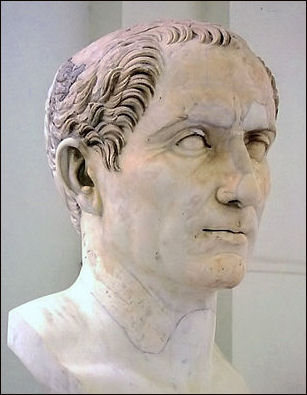 Early in his career Caesar was known as Rome's most efficient rabble-rouser. Steven Coats wrote in the New York Times, “His debts, and a proclivity for demagoguery, lent him an air of desperation, and the conservative elements in the Senate feared him as a revolutionary long before he illegally brought troops across the Rubicon, His great charm was a signature political asset, but in the fashion of the day he also had a knack for bribery, intimidation and — and some said — murder.”
Early in his career Caesar was known as Rome's most efficient rabble-rouser. Steven Coats wrote in the New York Times, “His debts, and a proclivity for demagoguery, lent him an air of desperation, and the conservative elements in the Senate feared him as a revolutionary long before he illegally brought troops across the Rubicon, His great charm was a signature political asset, but in the fashion of the day he also had a knack for bribery, intimidation and — and some said — murder.”
Caesar’s biggest problem was he had no money. To earn money he organized gangs of street toughs that went to forum and extorted money and roughed up the opposition. He also knew how to kiss the ass of the right people. Caesar’s money problems were eventually solved when Crassus, who was the richest man in Rome and needed Caesar’s help in a fight with his rival Pompey, payed off Caesar's debts [about $25 million in today's money].
To gets his legislation passed Caesar used to fill the Senate with "roughnecks" and "moonlighting gladiators" who made note of those who voted against Caesar (there usually weren't many). It also wasn't uncommon for senators to pull the text of a bill out of the hands of its sponsor while he was reading it. And if that didn't work they put their hand over the speakers mouth. Caesar himself didn't bother with such niceties. he simply had the man pulled down from the dais and imprisoned. [Source: Lionel Casson, Smithsonian]
Some have said that Caesar was motivated by a strong sense of purpose: he saw decay and corruption around him and concluded that he was the only person who could set Rome on a path to greatness.
The first phase of Rome becoming a major empire and Caesar become ruler of the known world was the creation of a power-sharing arrangement called the Triumvirate with Caesar, the popular general Pompey and Crassus, the richest man in Rome, as the money man.
In 60 B.C., with Crassus's money and help, Caesar was elected consul, a move which allowed him to take command of Rome's armies for his campaign in Gaul, which in turn helped him ultimately gain control of the entire Roman empire. [Source: Lionel Casson , Smithsonian]
See Separate Article: JULIUS CAESAR'S RISE AS A POLITICIAN: CICERO, CATO AND THE CATILINE CONSPIRACY europe.factsanddetails.com
Caesar in Gaul
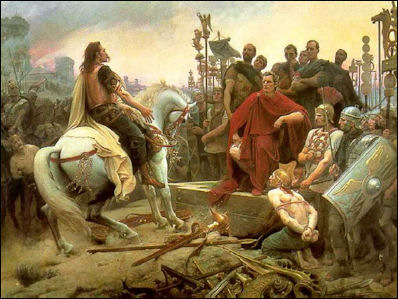
Siege of Alesia, Vercingetorix and Caesar Caesar's greatest military victory was the conquest of Gaul (France) in which 55,000 Romans battled 250,000 Celts in a campaign that lasted from 58 to 51 B.C. His account of the events — “Commentaries on the Gallic War” — is still regarded as a masterpiece. Modern historians have compared it to Churchill’s work.
In 58 B.C., after serving a year as consul, Caesar had himself named the governor of Gaul, where he distinguished himself as a superb organizer and a motivator of soldiers with whom he worked with, fought with and suffered with. He inspired such respect and affection from the men who served under him it was said they would do anything for him.
To protect his army of 40,000 men from the Gauls Caesar erected a fortress with a circumference of 14 miles. The fort was protected by hidden pit with upward pointing sticks, logs spiked with iron hooks, walls fashioned from forked timbers and double ditches. During one attack Celts hurled themselves bravely and foolishly at the fortress and were routed after the Roman cavalry charged down from a hill at a strategic time.
During his years in Gaul Caesar inexorably expanded Roman territory by defeating one tribe after another. He crossed the Rhine in 55 B.C. to preempt a German invasion. In 52 B.C., he put down the last great Gallic-Celtic uprising. Vercingetorix, the leader of the Gallic-Celtic forces, surrendered himself at the feet of Caesar who sent him to Rome where the Gallic leader was imprisoned for six years and then paraded through the streets and strangled in the Forum.
The historian Ernst Badian told National Geographic, "Blood was the characteristic of Alexander's whole campaign. There us nothing comparable in ancient history except Caesar in Gaul."
See Separate Articles: JULIUS CAESAR'S MILITARY CAREER: SKILLS, LEADERSHIP, VICTORIES europe.factsanddetails.com ; JULIUS CAESAR IN GAUL europe.factsanddetails.com
Caesar in Britain
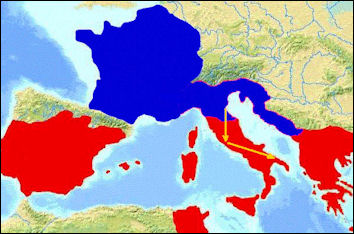
territory under Caesar's control
when he crossed the Rubicon in blue Caesar invaded Britain twice. He invaded Britain in 55 B.C. partly in hope of "getting pearls." Describing the invasion he wrote: "The Romans were faced with grave difficulties. The size of the ships made it impossible to run them aground except in fairly deep waters and the soldiers, unfamiliar with the ground, with their hands full, and weighed down by the heavy burden of their arms, had at the same time to jump down from the ships, get a footing in the waves, and fight the enemy." [Source: Eyewitness to History, edited by John Carey, 1987, Avon Books]
“The enemy, who, standing on dry land or advancing only a short way into the water, fought with all their limbs unencumbered and on preferably familiar ground, boldly hurling javelins and galloping their horses, which were trained for this kind of work. These perils frightened our soldiers, who were quite unaccustomed to battles of this kind, with the result that they did not show the same alacrity and enthusiasm as they usually did in battles on dry land."
"Seeing this, Caesar ordered the warships — which were swifter and easier to handle than the transports, and likely to impress the natives more by their unfamiliar appearance — to be removed a short distance from the others, and then to be rowed hard ashore on the enemy's right flank, from which position slings, bows, and artillery could be used by men on deck to drive them back."
"The maneuver was highly successful. Scared by the strange shape of the warships, the motion of the oars, and the unfamiliar machines, the natives halted and then retreated a little. But as the Romans hesitated, chiefly on account of the depth of the water, the man who carried the eagle of the tenth legion, after praying to the gods that his actions might bring good luck to the legion, cried in a loud voice, 'Jump down comrades, unless you want to surrender our eagle to the enemy; I, at any rate, mean to do my duty to my country and general.'"
"With these word he leapt out of the ship and advanced towards the enemy with the eagle in his hands. At this the soldiers, exhorting each other not to submit to such a disgrace, jumped with one accord from the ship, and the men from the next ships, when they saw them, followed them and advanced against the enemy."
See Separate Article: JULIUS CAESAR IN BRITAIN europe.factsanddetails.com
Caesar Crosses the Rubicon
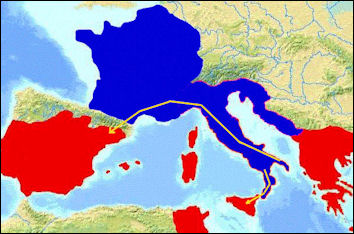
territory seized by Caesar during
the early Roman Civil Wars After Julius Caesar finished subduing Gaul in 51 B.C., he defied the Republican tradition of victorious Roman generals not being allowed to return to Rome with their armies out of fear they would try to overthrow the government, which is exactly what Caesar did.
While Caesar was away in Gaul, Crassus was killed and Pompey became leader. Pompey wielded great power and declared Caesar a public enemy and ordered him to disband his army. Caesar refused. When he moved his army from Gaul into Rome’s formal territory, it was interpreted as a declaration of war against Rome. Caesar reached the border of greater Rome at the Rubicon River. He then he plunged his horse in the water, shouting , “The die is caste.”
By crossing the Rubicon Caesar declared war on the political establishment of his day. For many historians it marked the end of the Roman Republic and the beginning of the Roman Empire. To this day “crossing the Rubicon? describes a decision from which there is no return.
By crossing the Rubicon Caesar gambled that he could not only beat his military rival Pompey but also could also outmaneuver conservative politicians like Cicero and Cato. Some historians say Caesar’s move marked the end of period in which foreign adventures created larger armies and more powerful generals and it was only a matter of time until they threatened the political status quo.
Book: “Rubicon — The Last Years of the Roman Republic” by Tom Holland (Doubleday, 2004)
See Separate Articles: CAESAR, POMPEY AND CRASSUS europe.factsanddetails.com ; CAESAR, THE CROSSING OF THE RUBICON AND THE SITUATION IN ROME AT THE TIME europe.factsanddetails.com
Roman Civil Wars
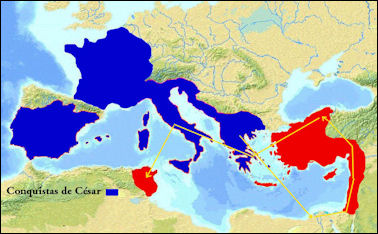
territory controlled by Caesar after he defeated Pompey Caesar marched into Rome with his army in and seized control of the government and the treasury and declared himself dictator while Pompey, in command of the Roman navy, fled to Greece. Five years of civil war followed.
Caesar defeated Pompey in a series of land battles that took place throughout the Roman empire over a four years period. After Caesar led a successful campaign in Iberia (Spain), he defeated Pompey in Greece. Pompey fled to Egypt. The Ptolemies refused to provide quarter for a loser and had him executed and cut off his head. This made Caesar the unchallenged leader. Caesar said, “It is more important for the state that I should survive...I have long had my fill of power and glory; but should anything happen to me, Rome will enjoy no peace.”
See Separate Article: CIVIL WAR AFTER CAESAR CROSSES THE RUBICON europe.factsanddetails.com
Caesar and Cleopatra
Julius Caesar, who essentially the dictator of Rome in Cleopatra's time, arrived in Egypt during the civil war between Cleopatra and her brother. Caesar came to claim the debts Egypt owed Rome and Cleopatra saw in him a chance to win back her kingdom and expand it into Syria, Palestine and Asia Minor. Her alliance with Caesar seems to have been strategic, romantic and sexual. For his part Caesar made little mention of Cleopatra in his account of the Alexandrine wars.
Caesar initially didn't want to have anything to do with Cleopatra but he was delayed in his return to Rome by unfavorable winds. According to Plutarch's version of events she had herself rolled up in bedsheets and delivered to Caesar, who was so besotted with her he orchestrated a reconciliation between Cleopatra and her brother and then had Ptolemy kill his former partner Pothinus. Pliny is said to be the source the rolled-up-in-bedsheets story. Many doubt its veracity. In the 1963 film Cleopatra Elizabeth Taylor's Cleopatra spills out of Persian carpet at the feet of Caesar ready to crawl up his legs.
When Cleopatra met up with Caesar he was a balding epileptic with a lot of experience with women. He was 32 years older than her and married. The two of them sailed down the Nile together in a 300-foot barge with gardens and banquet rooms. In 47 B.C., Cleopatra gave birth to Caesar's son, Ptolemy Caesarian (“Little Caesar”) . To honor the event she had a coin minted showing her as Aphrodite nursing Eros.
See Separate Article: CLEOPATRA'S RULE (51-30 B.C.): POLITICS, LEADERSHIP, CAESAR AND THE ROMANS europe.factsanddetails.com
Caesar Begins Making Rome Into an Empire
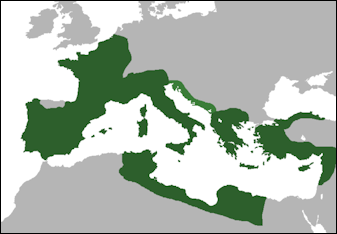
Roman empire at the time of Caesar's death Caesar’s campaign in Gaul allowed Rome to claim France, the Netherlands and Belgium. In campaigns early in the Civil Wars period he claimed Portugal, Spain, and Greece. With Egypt under the control of Cleopatra, Caesar set his sights on the Middle East.
After annihilating the Parthians in Pontus and Zela in the Middle East in 47 B.C., Caesar sent home the immortal message, "”Veni, vidi, vici” " ("I came, I saw, I conquered"). This victory allowed him to claim Syria, Israel, and western Turkey. Afterwards he returned home to Rome to fight another rival, Cato, who had gone to North Africa to raise an army to challenge Caesar. That didn’t happen. Instead, Caesar sent his army to Africa and crushed Cato.
In 46 B.C., the last of Pompey’s forces were defeated in Spain. With the civil wars over Caesar was the unchallenged leader of Rome. In the meantime Portugal, Spain, France, the Netherlands Belgium, Italy, Greece, Syria, Israel, western Turkey, and northern Libya were added to Rome under Caesar, making it a truly great empire.
See Separate Article: CAESAR’S DICTATORSHIP factsanddetails.com
Assassination of Caesar
In 44 B.C., Caesar declared himself “Dictator for Life” and was crowned with a royal diadem at a religious ceremony, ushering in the era of imperial Rome. Many Romans were appalled by Caesar’s audacious seizure of power and riled further when he placed a statue with his likeness next to statues of the founders of Rome. Almost immediately members of the Senate began plotting against him.
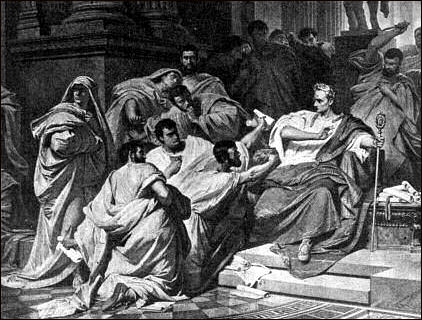 On the ides of March (March 15, 44, B.C.), a month after he proclaimed himself Dictator for Life, 55-year-old Caesar was assassinated on the floor of the Senate by Brutus and Cassius, an event recounted in a famous Shakespeare play.
On the ides of March (March 15, 44, B.C.), a month after he proclaimed himself Dictator for Life, 55-year-old Caesar was assassinated on the floor of the Senate by Brutus and Cassius, an event recounted in a famous Shakespeare play.
The assassination was a display of contempt against Caesar ruthless impoundment of power and rumors that he was planning to the rule the empire with Cleopatra from Alexandria. Brutus, a close friend of Caesar, and Cassius, the mastermind of the conspiracy, recruited 20 Senators and 40 other conspirators, including many people who had been loyal to Caesar. They ones that planned to participate in the killing carried daggers concealed under their cloaks. They probably believed they were acting on the behalf of Roman democracy.
“ The Assassination of Julius Caesar: A People’s History of Ancient Rome” by Michael Parenti
See Separate Article: ASSASSINATION OF JULIUS CAESAR europe.factsanddetails.com
Image Sources: Wikimedia Commons, The Louvre, The British Museum
Text Sources: Internet Ancient History Sourcebook: Rome sourcebooks.fordham.edu ; Internet Ancient History Sourcebook: Late Antiquity sourcebooks.fordham.edu ; “Outlines of Roman History” by William C. Morey, Ph.D., D.C.L. New York, American Book Company (1901) ; “The Private Life of the Romans” by Harold Whetstone Johnston, Revised by Mary Johnston, Scott, Foresman and Company (1903, 1932); BBC Ancient Rome bbc.co.uk/history/ ; Project Gutenberg gutenberg.org ; Metropolitan Museum of Art, National Geographic, Smithsonian magazine, New York Times, Washington Post, Los Angeles Times, Live Science, Discover magazine, Archaeology magazine, Reuters, Associated Press, The Guardian, AFP, The New Yorker, Wikipedia, Encyclopædia Britannica, Encyclopedia.com and various other books, websites and publications.
Last updated October 2024
